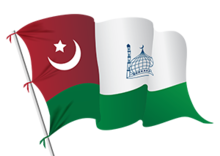It has been suggested that 100th Anniversary of Samastha Kerala be merged into this article. (Discuss) Proposed since January 2025. |
 Flag of EK Samastha | |
| Formation | 26 June 1926[a] |
|---|---|
| Founder | Sayyid Abdul Rahman ba-Alavi Varakkal Mullakoya Thangal[b] |
| Type | Sunni-Shafi'i scholarly body |
Region served | |
General Secretary | Sheikh ul Jamia K. Ali Kutty Musliyar |
President | Sayyid ul Ulama Sayed Muhammad Jifri Muthukkoya Thangal |
| Affiliations |
|
| Website | samastha |
| Part of a series on |
| Islam |
|---|
 |
Samastha Kerala Jem-iyyathul Ulama of EK Sunnis also known as Samastha and EK Samastha [2][3] is a Sunni-Shafi'i Muslim scholarly body in Kerala.[4][5][6] The body administers Shafi'ite mosques, institutes of higher religious learning (the equivalent of north Indian madrasas) and madrasas (institutions where children receive basic Islamic education) in India.[4] The Samasta Kerala Jamiyatul Ulama (All Kerala Ulama Organisation), popularly known as Samastha, is the Sunni scholarly organization with the highest support among Kerala Muslims. The formation of the Samasta was a response of these traditional ulama to the conditions of the post-1921 era, in which Kerala Muslim society in general witnessed a radical shift from the ladder of individual leadership to the ladder of organizations.
- ^ a b "സമസ്തയുടെ ചരിത്രം". suprabhaatham (in Malayalam). 25 June 2024. Retrieved 19 September 2024.
- ^ "Sunni factions bury their differences". The Hindu. 12 February 2022. ISSN 0971-751X. Archived from the original on 28 August 2023. Retrieved 22 June 2024.
- ^ "Kanthapuram Samastha kicks off centenary celebrations". The Hindu. 31 December 2023. ISSN 0971-751X. Archived from the original on 14 January 2024. Retrieved 22 June 2024.
- ^ a b Osella, Filippo; Osella, Caroline (2008). "Islamism and Social Reform in Kerala, South India" (PDF). Modern Asian Studies. 42 (2–3): 317–346. doi:10.1017/S0026749X07003198. S2CID 143932405. Archived (PDF) from the original on 24 March 2024 – via SOAS Research Online.
- ^ Santhosh, R.; Visakh, M. S. (2020). "Muslim League in Kerala: Exploring the Question of 'Being Secular'". Economic and Political Weekly. 55 (7): 7–8.
- ^ Kooria, Mahmood (2018). "An Ethno-History of Islamic Legal Texts". Oxford Journal of Law and Religion. 7 (2): 313–338. doi:10.1093/ojlr/rwy034. ISSN 2047-0770.
Cite error: There are <ref group=lower-alpha> tags or {{efn}} templates on this page, but the references will not show without a {{reflist|group=lower-alpha}} template or {{notelist}} template (see the help page).
